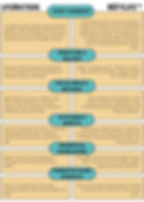Harnessing the Power of Strengths-Based Mental Skills Training (MST) for Youth Development
- SPRINT project
- Nov 22, 2024
- 4 min read
Today’s blog post from the SPRINT project highlights a new review published in Youth by Professor Jennifer Cumming, Dr Mary Quinton, Dr Grace Tidmarsh, and Dr Sally Reynard that reviews two strengths-based mental skills training interventions [Mental Skills Training for Youth Experiencing Multiple Disadvantage].
There is a pressing need for effective interventions to improve self-regulation and life skills among disadvantaged youth and strengths-based programs like LifeMatters and MST4Life™ are key examples. This blog post explores the benefits, implementation, and evaluation of these programs, highlighting their impact on youth facing multiple disadvantages.
Barriers to Youth Development
Young adulthood (16-25years) is an important time for development; however, many young people face multiple disadvantages, including health and social inequalities, educational gaps, and higher risks of unemployment and discrimination. These challenges, often intensified by adverse childhood experiences (ACEs), impair brain development and self-regulation, making it difficult to form relationships, manage stress, and make decisions.
Improving self-regulation can enhance educational and employment outcomes, financial management, and overall well-being. Poor self-regulation, however, leads to maladaptive coping strategies like substance abuse, perpetuating inequalities into adulthood. Traditional deficit-based interventions often contribute to stigma and engagement barriers.
In 2022-2023, an estimated 135,800 young people in the UK sought help for homelessness (Centrepoint, UK). Despite their resilience, these youth face disrupted development and poorer life outcomes. Services must go beyond basic needs to develop self-regulation skills, improving health, well-being, and future prospects. A strengths-based approach, which builds on existing capacities, fosters an empowering environment that supports aspirations, learning, and growth.

Image description: A napkin with
"what are my strengths" written on it.
A pen and mug of coffee resting next to the napkin
Understanding Mental Skills Training (MST)
Mental Skills Training (MST) is a ‘strength-based approach’ helping to build important life skills that enhance learning, performance and overall well-being. It uses simple techniques to improve how we think and act, called ‘cognitive-behavioral techniques’. These are strategies that help us change unhelpful thoughts and behaviors into positive ones.
It was originally created for athletes to perform better but MST has grown to support young people in all areas of life, helping them improve self-regulation skills and improve their well-being. One of the most unique parts is that instead of focusing on deficits or problems MST focuses on what you’re already good at recognizing and building on existing capacities. This makes it a holistic, non-stigmatizing method of improvement, giving young people the tools to: stay calm and focused in stressful situations, feel more confident and set achievable goals. Whether this be in school and work or personal relationships the application of MST is endless!
Now, let’s explore two programs that showcase this in action- LifeMatters: A Game-Based Life Skills Program (Harahan, 2017) and MST4Life™: Supporting Youth Experiencing Homelessness (Cumming et al., 2022).

PYD (Lerner, 2005); BPNT (Ryan & Deci, 2000; Deci & Ryan, 2002); SFBT (de Shazer, 2021); CARES (Cumming et al., 2022); Strengths-based principles (Rapp et al., 2006)
Conclusion
Adopting a strengths-based approach over a deficit-based one offers valuable insights for policymakers, commissioners, program planners, and researchers. In this review, we also highlight the importance of integrating MST or similar psychoeducational programs into broader actions to address systemic barriers and ensure sustainable outcomes for disadvantaged youth.
MST programs like LifeMatters and MST4Life™ provide robust frameworks for enhancing the mental skills, personal growth, and well-being of disadvantaged youth. Through engaging, supportive, and structured activities, these programs demonstrate significant potential in facilitating positive transitions and improving overall quality of life.
See our free MST4Life™ toolkits for strengths-based activities, guidance on how to deliver these activities, and how to evaluate the program [Toolkit | The Sprint Project]!
How will you integrate strengths-based approaches?
References
Centrepoint Summary Report: The Youth Homeless Databank 2022–2023; London, UK. 2023. Available online: https://centrepoint.org.uk/sites/default/files/2023-10/Centrepoint%20-%20Youth%20Homelessness%20Databank%202023%20Summary.pdf
Cumming, J., Whiting, R., Parry, B. J., Clarke, F. J., Holland, M. J., Cooley, S. J., & Quinton, M. L. (2022). The My Strengths Training for Life™ program: Rationale, logic model, and description of a strengths-based intervention for young people experiencing homelessness. Evaluation and Program Planning, 91, 102045. https://doi.org/10.1016/j.evalprogplan.2021.102045
Cumming, J., Quinton, M. L., Tidmarsh, G., & Reynard, S. (2024). Mental Skills Training for Youth Experiencing Multiple Disadvantage. Youth, 4(4), 1591-1609. https://doi.org/10.3390/youth4040102
de Shazer, S., Dolan, Y., Korman, H., Trepper, T., McCollum, E., & Berg, I. K. (2021). More than miracles: The state of the art of solution-focused brief therapy. Routledge.
Deci, E. L., & Ryan, R. M. (Eds.). (2004). Handbook of self-determination research. University Rochester Press.
Hanrahan, S. J. (2017). LifeMatters: Using physical activities and games to enhance the self-concept and well-being of disadvantaged youth. In Positive psychology in sport and physical activity (pp. 170-181). Routledge.
Lerner, R. M. (2009). 14 The positive youth development perspective: theoretical and empirical bases of strengths-based approach to adolescent development. Oxford handbook of positive psychology., 149, 163.
Parry, B. J., Quinton, M. L., Holland, M. J., Thompson, J. L., & Cumming, J. (2021). Improving outcomes in young people experiencing homelessness with My Strengths Training for Life™(MST4Life™): A qualitative realist evaluation. Children and Youth Services Review, 121, 105793. https://doi.org/10.1016/j.childyouth.2020.105793
Rapp, C. A., Saleebey, D., & Sullivan, W. P. (2006). The future of strengths-based social work. Advances in social work: Special issue on the futures of social work, 6(1), 79-90.
Ryan, R. M., & Deci, E. L. (2000). The darker and brighter sides of human existence: Basic psychological needs as a unifying concept. Psychological inquiry, 11(4), 319-338. https://doi.org/10.1207/S15327965PLI1104_03
Image credit: Canva
Written by Tasha Jordan-Dewhurst and Dr Georgia Bird